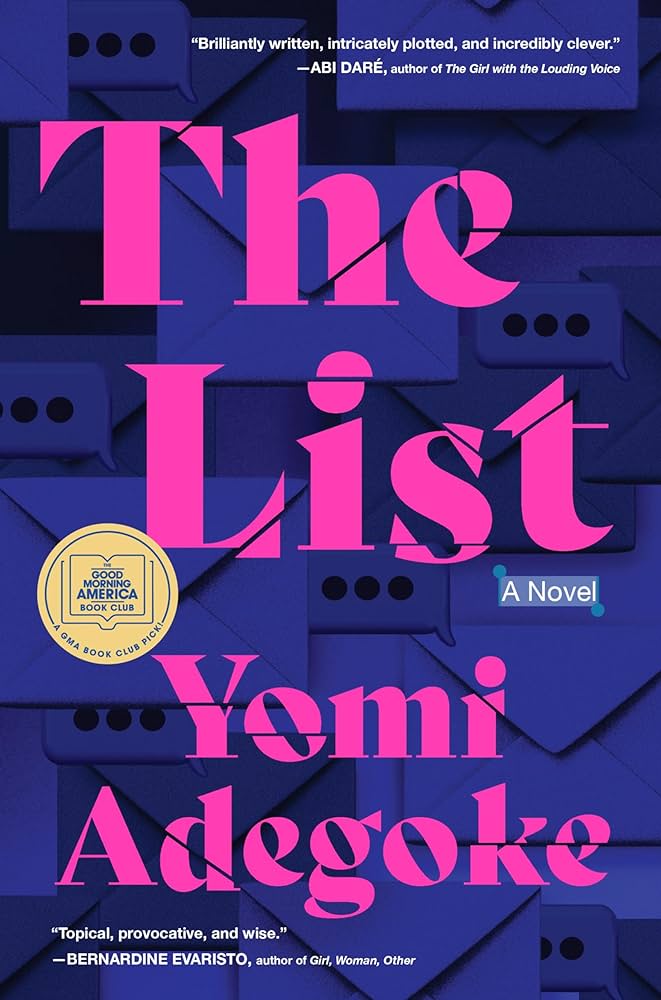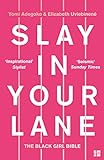Yomi Adegoke’s debut novel, The List, begins with the publication of the titular list: a crowdsourced index of alleged abusers (think the “Shitty Media Men” compendium of 2017). Caught in the list’s wake are journalist Ola and her fiance Michael, who are held up by strangers on social media as an exemplar of #BlackLove; things fall apart apace, however, when Michael is revealed to be on The List, leaving Ola to reckon with the disconcerting implications, both personal and professional, of the allegations her partner denies.
A clever and biting page-turner, The List’s jagged edge is tempered by its fiercely affectionate and funny-as-all-hell sideways look at the cultural conditions that serve as inspiration: from the soulful feel of Black-British “shubz” and other social gatherings, to the lingua franca of popular online forums for chatting breeze.
I talked with Adegoke about her favorite kinds of characters (“unlikeable”), her modus operandi in life (“unserious”), and being “unflinching” in depicting the many thorns so often flanking pathways to justice.
Tara Okeke: The List is your fiction debut but not your first time at the publishing rodeo, so to speak—that would be 2018’s Slay in Your Lane . What surprised you most this time around?
. What surprised you most this time around?
Yomi Adegoke: What really surprised me was how much the idea of being pigeonholed as a Serious Female Author™ held me back initially. I was so terrified of not being taken seriously that my first iteration of the book was so dry. I would have never read the first iteration of The List, but I was writing it! I think I got very bogged down with the idea of writing something literary and highbrow and I felt like it couldn’t be those things if it was enjoyable. It was almost like it has to be impenetrable, and confusing, in order for people to enjoy it. Saying that, I have seen quite a few reviews where people have been very transparent about the fact that The List just felt impenetrable to them because the characters are not just Black, but a [type of] Blackness they don’t recognize because it’s hyper-specific. This whole process, from writing to publication, has made me realize that a lot of Black authors probably don’t want to write stock Black characters that feel inauthentic or that feel like parts of them have been cut off in order to make them fit into mainstream, but they probably are pushed into doing so because publishers anticipate some of the responses I’ve received.
TO: If not as a Serious Female Author™, how do you see yourself and, by extension, your work?
YA: Like every millennial, I feel like I’m a multihyphenate: I started out as a journalist, pivoted into nonfiction books, and now I’m a novelist who’s going into screenwriting. [A television adaptation of The List is in the works at HBO, BBC, and A24.] I just like anything that allows me to communicate ideas, and I think I push back on the whole Serious Female Author™ thing because there is so much that I do and that I enjoy that immediately discounts me from the label. I like to write about serious things, but I want my books to be enjoyable, accessible and sell. I’m not remotely tortured as a writer: I’m someone that loves a good time and who, ultimately, started writing because I enjoyed it and had a lot to say. People struggle to hold multiple ideas in their heads at once, and so attempt to pigeonhole female writers, but I am very comfortable leaning into duality. It’s the people who think that wearing nice clothes and being intelligent are at odds that are the basic ones, actually.
TO: Can we talk about specificity? The List has been dubbed a novel about the internet, which is an increasingly generalising force. I found myself viewing it more as a novel born of the internet because that way of looking at it really emphasised the push-and-pull between it as a work brought into being by something generalising and its content, which is, as you say, hyper-specific and indebted to Black-Britishness. So, how did you approach situating these nested specifics – the places, the people, the patter – within a framework derived from the general?
YA: My approach to this was very similar to my approach in my journalism. I started out as a music journalist for The Guardian and I used to write a lot about really specific [Black-British] micro-trends and phenomena. I have a real anxiety of how much we lose in the Black-British community due to things not being noted, or written down, or being made part of the canon. In terms of how that related to The List: I wrote specific details [into the novel] knowing that it would be read by everyone [including] people outside of the community, and so I tried to be very unflinching in the fact that accuracy mattered over anything whilst also remembering and respecting the community I was depicting.

TO: As I made my way through the book, more so than being reminded of other novels I’ve read, I kept getting flashes of things I’ve watched. Jackie Sibblies Drury’s Fairview came to mind at one point…
YA: Oh. My. God. What a play.
TO: I know right? Astonishing. There’s also an episode of The Simpsons—“Homer Badman,” from the sixth season—that I couldn’t get out of my mind when reading. Two very different showcases of domestic (and situationally-comedic) drama—one a deconstruction of the organizing principle of race, the other an entreaty to organizing principle of the truth—but both, as part of my cultural diet, informed the way I digested The List. What’s your cultural diet like? What were you watching while writing?
YA: I either watch really impeccable stuff or stuff that’s absolutely abysmal. While writing The List, I got into It’s Always Sunny in Philadelphia because I found out they did an episode that satirizes 2017’s “Shitty Media Men” list. I watched that one episode and never looked back: it’s great TV, with horrible characters you root for, much like Peep Show and Succession. I’m really into unlikeable characters and found myself watching things with objectively awful protagonists. But then I’d also binge brain-smoothing Lifetime and Hallmark movies because it gave me a chance to stop thinking entirely after writing such complicated, thorny stuff. I also think you learn as much from good shows and writing as you do bad shows and writing: Lifetime movies are a masterclass in what to avoid!
TO: You wrangle with various complicated, thorny premises in the novel, the main one being that our society and its systems of justice—both official and unofficial—are foundationally compromised. And this premise gives rise to some brutal realities, mostly about the men of the novel. The novel smartly forgoes a neat and tidy narrative arc, but I wonder—did you not feel compelled to explore what unequivocal and uncompromised justice might look like for those, especially the women of the novel, who had been harmed?
YA: I didn’t as much as I thought I would. Don’t get me wrong: justice is something I fixate on and deeply long for like everyone else, but I think my primary obsession is realism. With The List, I very much wanted to hold up a mirror to the world as it was in 2019, and basically is still now, and I think any other approach would have done a massive disservice to the many survivors in and outside of the novel that have been harmed in different ways. One frustrating thing about writing in this time is that many readers want to engage with adult fairytales—or, as I call it, the “Disney-fication of literary fiction.” They want those neat and satisfying endings. But I’m always —whether in fiction or nonfiction—trying to write something that feels resonant and captures a moment in time in a way that feels recognizable and, most importantly, real.

